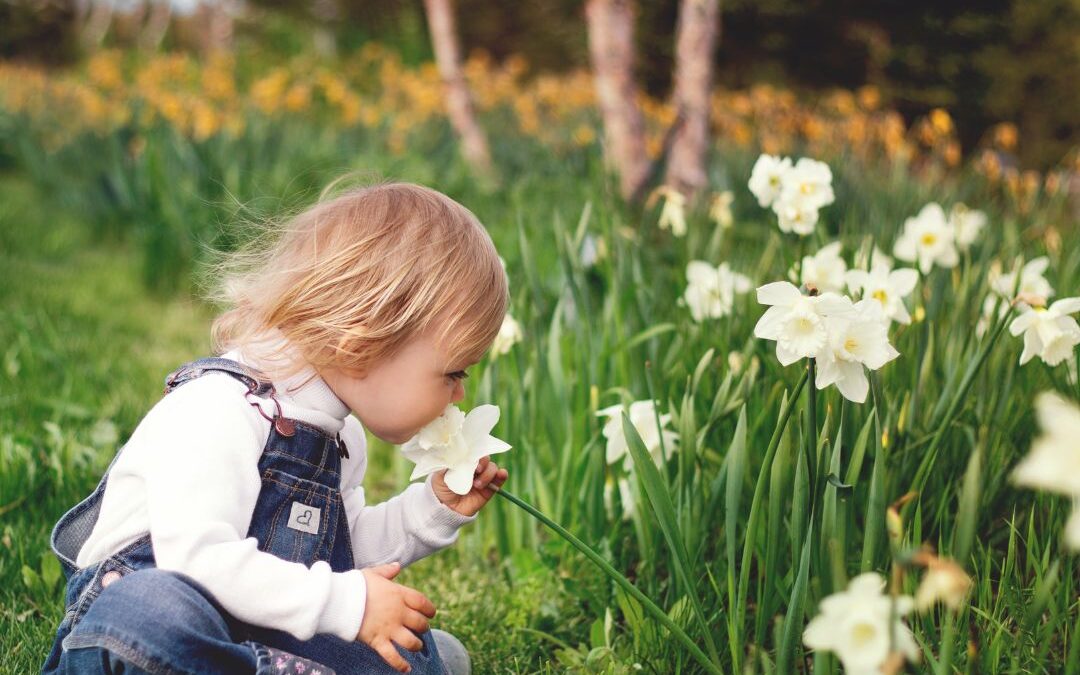
Child smelling spring flowers in a meadow
The last signs of winter are fading away and spring is here. As we welcome the new season, it’s more important than ever to heed the timeless advice to “stop and smell the roses.” Beyond the budding flowers and chirping birds, there’s something deeply psychological about the aroma of spring. Our sense of smell, often overlooked in comparison to sight and hearing, plays a pivotal role in how we experience the world around us, especially during this special season.
“When I was a boy, I thought scent was contained in dewdrops on flowers and if I got up very early in the morning, I could collect it and make perfume.” – Oscar de la Renta
The science of scent
To truly appreciate the significance of the smells of spring, we have to understand the nature of our olfactory system and its evolutionary roots. Our sense of smell has been key to survival. For example, long before the fridge was invented, our noses alerted us to spoiling food, helped us detect the presence (or in this case, urine or musk) of any predators, and sounded the alarm whenever there was smoke or another dangerous odour nearby. Research also suggests that we use our sense of smell to pick out potential friends and partners with compatible genetic traits, and the loss of smell can lead to changes in eating habits, social relationships, and even depression.
Our sense of smell, or olfaction, is controlled by a specialized organ located in the nasal cavity known as the olfactory epithelium. This network of sensory receptors is capable of detecting a vast array of chemical compounds, each carrying its own unique scent profile. It’s believed that, during the evolution of the human race, the brain became much bigger and olfactory organs became smaller, leaving vision and hearing to be considered more important senses. However, this primitive sense has evolved into a complex sensory system that continues to shape our perceptions and behaviours.
Unlike other senses, such as vision or hearing, which rely on external stimuli, our sense of smell is connected to the limbic system—the emotional centre of the brain—meaning our memories are completely tied up in scents. Just one whiff can trigger some powerful memories and emotions. Think about the last time you smelled a loved one’s perfume or cologne, or the scent of baked goods in the oven during the holidays. How did you feel? What memories came to mind?
Scents can also influence mood, cognition, and behaviour, eliciting feelings of relaxation, arousal, or even nostalgia. This phenomenon, known as aromatherapy, has gained traction as a holistic approach to promoting mental health and emotional balance.
Suggested Video: Making Sense of Scents: 3D Videos Reveal How the Nose Detects Odor Combinations
“Nothing brings to life again a forgotten memory like fragrance.” – Christopher Poindexter
Get a whiff of this …
When it comes to springtime scents, there are so many fragrances to consider and appreciate. The following three are perhaps among the most familiar. Here’s a look at how they can impact our minds and bodies when we take a deep breath:
- Fresh air: When we open our windows or take a step outside and breathe in “fresh air” it can trigger feelings of rejuvenation and optimism, maybe even bringing up memories of past spring seasons and associated positive experiences. In one study, “fresh air” was characterized by a distinct absence of smell. (For instance: “there is no smell so it’s clean … If you’re in the city, for instance, you can smell the traffic.”) When we inhale fresh air, we stimulate the olfactory system, sending signals to our brain’s limbic system, particularly the amygdala and hippocampus, which are connected to processing emotions and forming memories. Studies have also shown that exposure to natural settings can reduce cortisol levels, our body’s main stress hormone, which helps us decrease stress and anxiety — another reason to open the windows or make time for a short walk during a lunch break.
- Rain: One study suggests we’re more likely to report symptoms of depression during rainy or overcast weather. However, when we smell rain, we tend to feel nostalgic, tranquil, and connected to nature. We may have memories of playing in the rain as a child, or time spent indoors listening to the soothing sound of raindrops. The earthy fragrance we smell when rain hits dry ground is produced by bacteria. It’s known as ‘petrichor’ and was named by two Australian researchers in the 1960s. The word was coined from Greek petros, meaning “stone”, and ichor, meaning “the fluid that flows in the veins of the gods.” When rain falls, geosmin is released into the air, and humans are so drawn to it, it’s becoming more common as a perfume
- Flowers: The scent of flowers can spark feelings of happiness and joy. The scent of flowers stimulates the limbic system in the brain, which regulates emotions, memory, and mood. This can lead to the release of endorphins, and some studies suggest that certain floral scents, such as jasmine and lavender, may also have sedative effects, which can help with relaxation and sleep. It’s no coincidence scented candles often feature floral fragrances. These fragrances, however, aren’t just for our enjoyment — they send out signals from plants to attract pollinators. A study published in the journal Science suggests air pollution is making it difficult for flowers to propagate the next generation.
Suggested Video: Why Smell is More Important Than You Think
Stop and smell the roses
This spring, enjoy the sensory delights of spring and recognize the profound power of our sense of smell to enrich our daily lives. Be mindful of the subtle aromas that surround us, and tap into a wealth of psychological benefits this season has to offer. Whether it’s going for a walk through a garden or simply pausing to breathe in some fresh air, we can nourish our minds, bodies, and spirits.
Written by Rosie Del Campo



